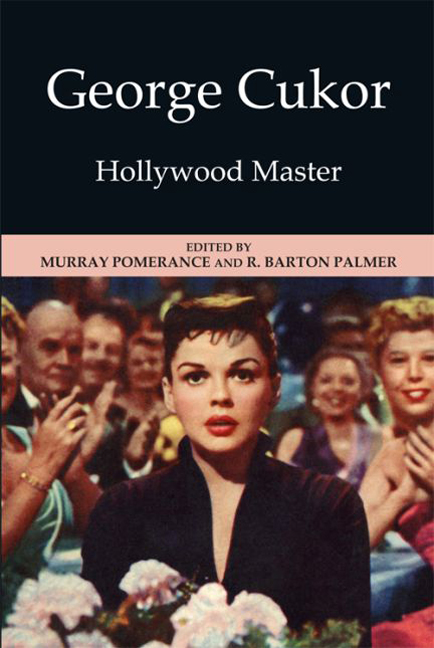Book contents
- Frontmatter
- Contents
- List of Figures
- List of Contributors
- Acknowledgments
- Introduction
- 1 Cukor's Tragicomedies of Marriage: Dinner at Eight, No More Ladies, The Women, and The Marrying Kind
- 2 George Cukor's Late Style: Justine, Travels With My Aunt, and Rich and Famous
- 3 Libel, Scandal, and Bad Big Names: It Should Happen to You, Les Girls, Camille, and Romeo and Juliet
- 4 The Cukor “Problem”: David Copperfield, Holiday, and The Philadelphia Story
- 5 Modulations of the Shot: The Quiet Film Style of George Cukor in What Price Hollywood?, Born Yesterday, Sylvia Scarlett, and My Fair Lady
- 6 Doubling in the Cinema of George Cukor: The Royal Family of Broadway, A Bill of Divorcement, A Double Life, and Bhowani Junction
- 7 George Cukor and the Case of an Actor's Director: Hepburn and/or Tracy in Little Women, The Actress, Keeper of the Flame, Adam's Rib, and Pat and Mike
- 8 Cukor Maudit: Tarnished Lady, Girls About Town, Our Betters, Susan and God, Desire Me, Edward, My Son, The Model and the Marriage Broker, Let's Make Love, and The Chapman Report
- 9 George Cukor's Theatrical Feminism: Gaslight, Heller in Pink Tights, A Life of Her Own, and A Star is Born
- 10 The Furthest Side of Paradise: Two-Faced Woman, A Woman's Face, Hot Spell, Wild is the Wind, and Winged Victory
- Works Cited and Consulted
- Index
1 - Cukor's Tragicomedies of Marriage: Dinner at Eight, No More Ladies, The Women, and The Marrying Kind
Published online by Cambridge University Press: 07 October 2017
- Frontmatter
- Contents
- List of Figures
- List of Contributors
- Acknowledgments
- Introduction
- 1 Cukor's Tragicomedies of Marriage: Dinner at Eight, No More Ladies, The Women, and The Marrying Kind
- 2 George Cukor's Late Style: Justine, Travels With My Aunt, and Rich and Famous
- 3 Libel, Scandal, and Bad Big Names: It Should Happen to You, Les Girls, Camille, and Romeo and Juliet
- 4 The Cukor “Problem”: David Copperfield, Holiday, and The Philadelphia Story
- 5 Modulations of the Shot: The Quiet Film Style of George Cukor in What Price Hollywood?, Born Yesterday, Sylvia Scarlett, and My Fair Lady
- 6 Doubling in the Cinema of George Cukor: The Royal Family of Broadway, A Bill of Divorcement, A Double Life, and Bhowani Junction
- 7 George Cukor and the Case of an Actor's Director: Hepburn and/or Tracy in Little Women, The Actress, Keeper of the Flame, Adam's Rib, and Pat and Mike
- 8 Cukor Maudit: Tarnished Lady, Girls About Town, Our Betters, Susan and God, Desire Me, Edward, My Son, The Model and the Marriage Broker, Let's Make Love, and The Chapman Report
- 9 George Cukor's Theatrical Feminism: Gaslight, Heller in Pink Tights, A Life of Her Own, and A Star is Born
- 10 The Furthest Side of Paradise: Two-Faced Woman, A Woman's Face, Hot Spell, Wild is the Wind, and Winged Victory
- Works Cited and Consulted
- Index
Summary
Comedy of manners, drawing room comedies, tragicomedies: these are all terms we might apply to the Cukor films I will discuss in this chapter, though two, Dinner at Eight, and The Women might also be considered ensemble come¬dies. They are films largely derived from Broadway successes, rewritten and reimagined for the screen by some of the best writers working in Hollywood alongside a director known not only for his sensitive work with actors but also for infusing drama into all his comedies, to shape both modes with great irony.
Dinner at Eight (1933) exemplifies the style Cukor brought to these sorts of films, and one can see a direct line from this film to The Women (1939), as both weave multiple narrative threads towards gatherings of a group, Dinner at Eight's arduously planned and star-crossed dinner party, and The Women's climatic confrontation in the women's lounge at an upscale New York City night club. This structure is shared to some degree by No More Ladies (1935), which Cukor finished after the illness of MGM director Edward H. Griffith, without wishing to assume directorial credit. This film's focus on marriage difficulties in its upper-class New York City milieu culminates in a party planned as revenge on a cheating husband, in which several of his former conquests and a wronged husband converge on a country house. This chapter will explore this structural dynamic of building narrative threads towards a climactic ensemble scene in these three films.
Concluding my discussion will be analysis of another, later Cukor film that has less of the ensemble characteristics: The Marrying Kind (1952). Its focus on working-class marriage sets it apart from the upper-class concerns of the other films, yet it shares their tragicomic mode.
All four films feature actors from whom Cukor encouraged fascinating perfor¬mances, including actresses in supporting roles, especially the “grand dames” Edna May Oliver in No More Ladies, Marie Dressler in Dinner at Eight, and Mary Boland in The Women. While much attention has been paid to Cukor's work with female stars, for which The Women, with its all female cast is exemplary, these films also have remarkable work by male actors, displaying male vulnerability and loss alongside masculine charms.
- Type
- Chapter
- Information
- George CukorHollywood Master, pp. 11 - 27Publisher: Edinburgh University PressPrint publication year: 2015



